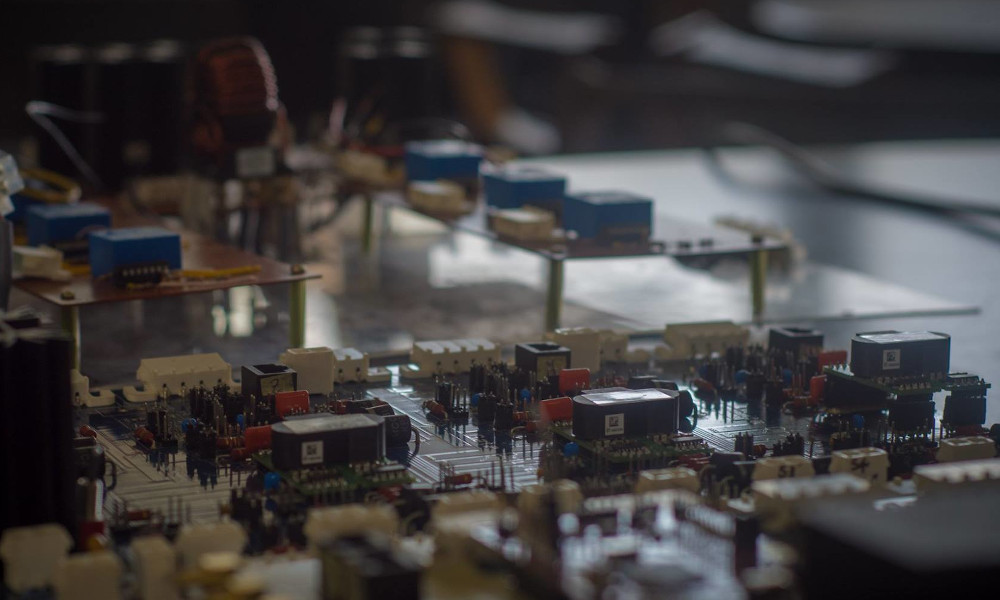Precision, Passion, and Progress; No Instrument - No Industry
The Electronics and Instrumentation laboratory is the state-of-the-art facility that provides students with the opportunity to learn and apply the principles of analog electronics to digital logic designs and instrumentation in a hands-on environment. The laboratory is equipped with a wide range of equipment, including oscilloscopes, function generators, power supplies, digital multimeters, and various sensors and actuators. This allows students to conduct experiments and design and build electronic circuits and instrumentation systems.
The EI lab is used for a variety of undergraduate and graduate courses in DEEE. In these courses, students learn about the design, construction, and testing of electronic circuits and instrumentation systems. The lab provides them with the opportunity to develop the skills and knowledge they need to design and build innovative and effective electronic circuits and instrumentation systems. In addition to its educational role, the EI laboratory is also used for research purposes. Faculty and graduate students use the laboratory to conduct research on a variety of topics, including new electronic circuit designs, new instrumentation techniques, and new applications for electronics and instrumentation in industry and science.

CONTRIBUTION TO TEACHING
The BME laboratory is used for conducting practical classes for students who follow courses related to Biomedical Engineering, Instrumentation, signal and image processing, etc. Below, you will find a list of laboratory classes belonging to several courses offered under Biomedical Engineering sub-specialization.
| SEMESTER | SUBJECT | EXPERIMENT | ||
|---|---|---|---|---|
| 2 | GP118 - Basic Electrical and Electronic Engineering (General Program) | 1) Performance of the Diode rectifier | ||
| 2) OP Amp and transistor applications | ||||
| 3) Circuit Simulation | ||||
| 4) Laboratory Experiment on Mutual Inductance | ||||
| 3 | EE251 - Principles of Electrical Measurements | 1) Cathode Ray Oscilloscope + demo | ||
| 2) AC measurements | ||||
| 3) AC bridges | ||||
| EE252 - Electronic Devices and Circuits | 1) Diode characteristics and applications | |||
| 2) Static characteristics of transistor | ||||
| 3) Two stage direct coupled amplifier design (2 sessions) | ||||
| EE 253 - Digital Logic Design | 1) Combinational Logic Circuits | |||
| 2) Special logic circuits/ Electrical Properties of Logic Gates | ||||
| 3) Sequential Logic Circuits | ||||
| 4) Design of Finite State Machines | ||||
| 5) FPGA Lab 1 (after mid) | ||||
| 6) FPGA Lab 2 (after mid) | ||||
| 4 | EE254 - Electronic Instrumentation | 1) OP-AMP Lab1 - OP-AMP Characteristics | ||
| 2) OP-AMP Lab2 - Differentiator and Integrator | ||||
| EE281 - Introduction to Electrical Engineering II | 1) Cathode Ray Oscilloscope | |||
| 2) Diode Characteristics and Applications | ||||
| 3) BJT Characteristics | ||||
| 4) Common Emitter Amplifier | ||||
| 5) Basic Applications of Operational Amplifiers | ||||
| EE285 - Electronics I | 1) Cathode Ray Oscilloscope | |||
| 2) Diode Characteristics and Applications | ||||
| 3) BJT Characteristics | ||||
| 4) Common Emitter Amplifier | ||||
| 5) Basic Applications of Operational Amplifiers | ||||
| 5 | EE322 - Embedded System Design | 1) Lab 1 | ||
| 2) Lab 2 | ||||
| 3) Lab 3 | ||||
| 4) Lab 4 | ||||
| 5) Lab 5 | ||||
| EE 351 - Electronic Circuits | 1) DC-DC Converters | |||
| 2) Inverters | ||||
| 3) Thyristor | ||||
| 4) Design of an Active Filter (after MID Exam) | ||||
| 5) Design of a Wien Bridge Oscillator (after MID) | ||||
| EE386 - Electronics II (Com. Dept Students) | 1) Active Filter Design | |||
| 2) Oscillator Design | ||||
| 6 | EE356 - Electronic Product Design and Manufacture | 1) Project Discussions | ||
| 7 | EE403/559 - Integrated Analog Electronic Circuits | 1) Design and of a Differential Amplifier1(based on SPICE) | ||
| 2) Design and of a Differential Amplifier2 | ||||
| 3) Design and of a Differential Amplifier3 | ||||
| EE575 - Power Electronics Applications and Design | 1) PSCAD simulation based lab 1 | |||
| 2) PSCAD simulation based lab 2 | ||||
| 3) PSCAD simulation based lab 3 | ||||
| 8 | EE561 - Industrial Instrumentation | 1) Instrumentation Laboratory | ||
| EE587 - Digital Systems Design and Synthesis | 1) Digital Synthesis Laboratory | |||

Research and Innovation
This laboratory provide facilities for research and development in electronics, instrumentation and inter-related areas such as amplifier/filter designs, data acquisition, circuit modelling, FPGA programming, embedded system designs, microcontroller programing, instrumentation, etc. As mentioned, the lab has a variety of equipment and resources that allow students and staff to test and develop embedded systems, DAQ systems, and devices, etc. Some of the common research and development topics that are investigated in EI lab include: Data acquisition, FPGA programing, design of embedded systems for industry related projects, modeling and design of power electronics and logic circuits, etc. Some of the recent collaborative projects with the industry and other research institutions and also postgraduate projects can be found here: collaborations of institutions, industry and PG projects.
SOFTWARE, EQUIPMENT AND EXPERIMENTAL SETUPS
Below, you will find pictures/details of laboratory setups, equipment, and software tools belonging to the Electronics and Instrumentation laboratory.
| FPGA Development Kit | Logic Analyzer | Isolate Dual Power Supply | Microcontroller Development Kit |
CONTACT INFORMATION


